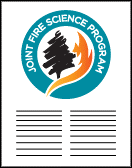United States Joint Fire Science Program

Joint Fire Science Program Research Project Reports
Document Type
Article
Date of this Version
2011
Citation
Final Project Report: JFSP Project Number 09-2-01-22
Abstract
Fuel management decisions are made within a larger context of resource management characterized by multiple objectives including ecosystem restoration, wildlife management, commodity production (from timber to less traditional forest products), and provision of recreation opportunities and amenity values. Implementation of fuel treatments is strongly influenced by their perceived influence on and compatibility with overarching management objectives. In some cases these objectives may be complementary while in others they may involve difficult tradeoffs. Such tradeoffs are only further complicated by institutional mandates, limited availability of information, and complex ownership patterns. Like natural resource managers across the U.S., those in the Great Lakes Region must balance these competing demands as they seek to build their management programs. However, there is limited information available to support these management decisions in the mixed red (Pinus resinosa Ait.) and eastern white pine (P. strobus L.) forests of the Northern Lake States compared to other fire-dependent ecosystems. This project was designed to help fill this gap by completing a review of existing research and, working with practitioners from across the region, developing a decision-aiding tool relevant to the local management context. Specific deliverables include a written summary of knowledge on fuel treatment practices in mixed-pine forests and a computer based decision-aiding tool that allows users to weight objectives according to their own management goals and calculate the expected utility of alternative fuels treatment options.
Included in
Forest Biology Commons, Forest Management Commons, Natural Resources and Conservation Commons, Natural Resources Management and Policy Commons, Other Environmental Sciences Commons, Other Forestry and Forest Sciences Commons, Sustainability Commons, Wood Science and Pulp, Paper Technology Commons


Comments
US government work.